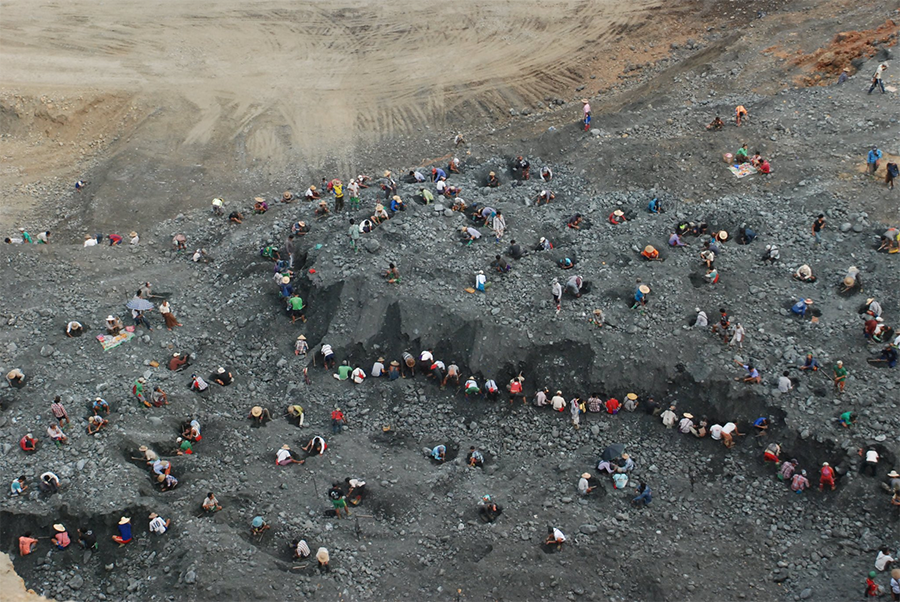YANGON — Three of the world’s largest mining machinery manufacturers, Caterpillar, Komatsu and Volvo, contribute to human rights abuses in Myanmar by selling equipment to local mining companies with reputations for irresponsible extraction of jade and other resources, according to a human rights and environment watchdog’s report published on Wednesday.
“Komatsu, Caterpillar, and Volvo CE appear to be the dominant brands represented in the Hpakant jade mines,” said Swedwatch, a Stockholm-based organization investigating the companies in an effort to get them to take responsibility for human rights and the environment.
“Since the early 2000s, the dramatically increased use of heavy mining machinery in Myanmar has enabled the extraction of minerals at an unprecedented speed,” Swedwatch says in the report.
Jade mining is a multi-billion-dollar industry for Myanmar, home to the world’s largest jade mine complex comprising 20,000-30,000 acres located near Hpakant Township in Kachin State in northern Myanmar. The jade mine is a flashpoint of fighting between ethnic Kachin armed groups and the Myanmar military (or Tatmadaw).
The Tatmadaw’s official interests in Myanmar’s jade sector are held primarily through its companies Myanmar Economic Holdings Limited and Myanmar Economic Corporation. The jade industry’s total revenue in 2014 was US$31 billion — equivalent to half the country’s GDP, or 64 times government spending on healthcare, according to a Global Witness report from 2015.
Swedwatch was unable to find reliable statistics on the number of active mining machines in Myanmar, but it estimates that thousands are currently in operation in Hpakant, while a couple hundred more are active in copper mines in Monywa, Sagaing Division. Copper projects linked to the military have stirred controversy over the years due to allegations of forced evictions, unlawful land confiscations, and causing severe pollution that jeopardizes the livelihoods and health of local populations, Swedwatch said.
“None of the [machinery] companies are able to demonstrate adequate efforts to identify, mitigate or prevent risks associated with the use of its equipment, specifically as regard to adverse impacts on human rights and the environment in the nation’s mining areas,” Swedwatch says in the report.

According to the report, thousands of people have lost their land, which Swedwatch links to heroin addiction among young people and other harmful effects, especially on the lives of woman and children. It also claims hundreds of people die each year in landslides, flooding and road accidents linked to the mines.
According to media reports from 2015 to 2018, 128 miners were killed in a series of landslides involving mountains of soil deposited at dump sites in the area by mining companies. Self-employed miners commonly scavenge for pieces of jade among the masses of stony waste carried to the sites in huge dump trucks.
Local residents told Swedwatch that in most cases, mining companies obtain the land used for mining by unlawfully confiscating it or pressuring owners to sell it for less than market value.

According to Swedwatch, Caterpillar did not respond to questions about whether its sales of mining equipment in Myanmar were in breach of its own code of conduct. Volvo CE and Komatsu both told Swedwatch they were unaware of any negative impacts on local communities related to the use of the equipment they sold in Myanmar.
Maw Htun Aung, an independent analyst specializing in natural resources governance, told The Irrawaddy that, “Even at the international level, the degree to which a company should be held responsible for the use of its products is still a topic of debate.”
He described the situation as “similar to Apple’s responsibility to uphold HR standards at its suppliers’ factories in China. These machinery companies rarely operate directly in Myanmar. According to their records, [the machines] appear to have been sold [via] Singapore, Malaysian or Chinese companies.”
According to Swedwatch’s report, the mining machinery used in Myanmar’s mines is sourced both through official routes via Yangon, and through unofficial smuggling routes via China. Machines entering through China are generally older and bought on the second-hand market, while machines entering via Yangon tend to be new and sold via a local dealer. The latter channel potentially gives the machinery makers greater control over the use of their products, Swedwatch said.
US-based Caterpillar declined Swedwatch’s request to clarify its findings in Myanmar. It merely cited its code of conduct, which pledges that “customers use our products to help build a better world” and “in a manner that promotes human rights.”
According to the report, the three companies do not have their own offices in Myanmar, but their distributors and dealers do. Volvo CE and Komatsu share their codes of conduct or similar policies with local business partners in Myanmar, but these partners are not contractually obliged to adhere to them and make no formal agreement to do so.
Volvo CE, which is headquartered in Sweden, explained that its dealers are independent and represent other manufacturers as well. Japan-based Komatsu said its code of conduct only applies to Komatsu group companies, but that its agreement with its distributor in Myanmar contains a provision requiring the distributor to conduct business in a socially responsible and ethical manner.
However, “The companies do not appear to have made any attempts to monitor the extent to which their business partners in Myanmar adhere to the code/policy that has been conveyed,” the Swedwatch report says.
“The companies lack adequate safeguards in relation to the risks of being implicated in gross human rights abuses in Myanmar or other high-risk areas where their products are sold,” it adds.

















